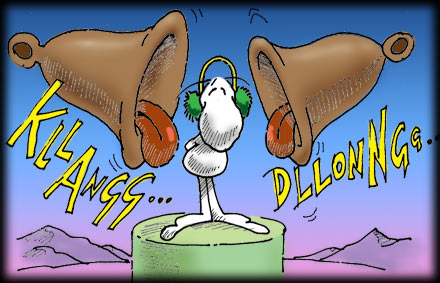Proposto
da - Proposed by Adalberto Nascimento
Due campane iniziano a suonare insieme.
Una delle campane suona poi ogni 7/4 di secondo.
L'altra campana suona ogni 4/3 di secondo.
I
rintocchi separati di 1/2 secondo, o meno, vengono percepiti
come un unico suono.
Quanti rintocchi si potranno udire in 15
minuti?
_______
Two
bells start to play together.
One of them tolls every 7/4 of second.
The other one tolls every 4/3 of second.
The strokes divided by 1/2 second, or less, are lissen like one stroke.
How many strokes can be lissen during 15 minutes?
Risolto
da:
Solved by:
Dino
Liberatore (19-04-02 11:52)
la soluzione
è sotto:
the solution is below:
Soluzione:
Solution:
Il
minimo comune multiplo tra 7/4, 4/3 e 1/2 Ŕ 12.
Il tempo in secondi Ŕ 900
E' quindi possibile lavorare con le seguenti frazioni:
21/12, 16/12, 6/12 e 10800/12
di cui possiamo utilizzare il solo numeratore.
Dati:
campana1: 1 rintocco iniziale poi ogni 21
campana2: 1 rintocco iniziale poi ogni 16
la prima coincidenza di suoni avviene nell'istante 0
la seconda coincidenza di suoni avviene a 21*16 = 336
Possiamo considerare le unitÓ da 0 a 335 come un ciclo che si ripete
10800/336=32 con l'avanzo di 48 (48/12=4 secondi).
Basta trovare i rintocchi udibili in un ciclo, moltiplicare il risultato
per 32
e infine aggiungere i rintocchi udibili nelle 48 unità iniziali
dell'ultimo ciclo.
Elenchiamo gli istanti in cui rintoccano le due campane
evidenziando i tempi la cui differenza sia <=6
The
m.c.m. of 7/4, 4/3 e 1/2 is 12.
The time in seconds is 900
Therefore, we can use the following fractions:
21/12, 16/12, 6/12 e 10800/12
of which we can only consider the numerator.
Data:
bell 1: 1 initial toll then every 21
bell 2: 1 initial toll then every 16
the first toll coincidence happens at the istant 0
the second toll coincidence happens at 21*16 = 336
We can consider the units from 0 to 335 as a loop that repeats itself
10800/336=32
times with the remainder of 48 (48/12=4 seconds).
We have to multiply the audible tolls in one loop by 32 adding then
the audible
tolls in the first 48 units of the last loop.
This is a list of the istants when the bells toll.
Unis. represents the times where the difference is <=6
|
rintocchi
- tolls
|
unis.
|
|
|
camp.bell
1
|
camp.bell
2
|
|
|
0
|
0
|
*
|
|
16
|
21
|
*
|
|
32
|
||
|
48
|
42
|
*
|
|
64
|
63
|
*
|
|
80
|
84
|
*
|
|
96
|
105
|
|
|
112
|
||
|
128
|
126
|
*
|
|
144
|
147
|
*
|
|
160
|
168
|
|
|
176
|
||
|
192
|
189
|
*
|
|
208
|
210
|
*
|
|
224
|
231
|
|
|
240
|
||
|
256
|
252
|
*
|
|
272
|
273
|
*
|
|
288
|
294
|
*
|
|
304
|
||
|
320
|
315
|
*
|
(336 inizio nuovo ciclo)
Per trovare i rintocchi udibili si devono contare tutti i rintocchi
(21+16=37) e sottrarre il numero degli asterischi (13 unisoni): 37-13=24
I rintocchi udibili sono quindi rappresentati da:
24
* 32 + 4 = 772
(336
starts a new loop)
The audible tolls in a loop are calculated counting all the tolls (21+16=37)
and then subtracting the unisons number (13 unisons): 37-13=24
So, the total audible tolls are:
24 * 32 + 4 = 772
